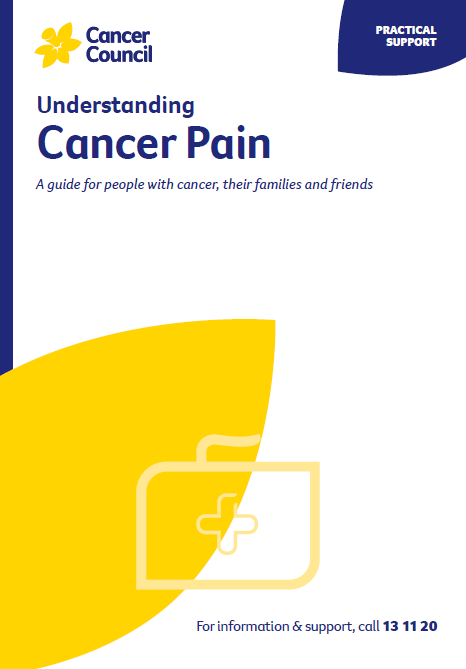- Home
- Head and neck cancers
- Managing side effects
- Pain, numbness and stiffness
Pain, numbness and stiffness
Below are some suggestions for managing pain and physical discomfort after treatment for head and neck cancer.
Learn more about managing:
- Pain
- Nerve damage
- Swelling and pain
- Reduced mouth opening
- Pins and needles or numbness
- Podcast: Managing Cancer Pain
Pain
Ongoing pain, numbness and restricted movement in the head and neck area can be upsetting and cause low mood, fatigue or reduced appetite. These can all affect your quality of life. Speak to your treatment team about ways to manage pain and regain movement, which may include medicines, positioning for comfort, exercises and other methods.
Your specialist, cancer care coordinator or GP can suggest other health professionals to see, such as a physiotherapist, occupational therapist, speech pathologist, massage therapist, psychologist or pain specialist.
Learn more about pain and cancer or listen to our podcast on managing cancer pain below.
Nerve damage
If you have lymph nodes removed from your neck, you may have pain and stiffness in your shoulder, or nerve damage that makes your neck feel tight and numb. This may affect how you are able to move your neck or it may make it hard to lift your arm.
Partial nerve damage usually heals within 12 months, and feeling should return for many people. In some cases, issues to do with nerve damage are permanent.
Swelling and pain
Some swelling, pain and stiffness in the head and neck area is common after surgery or if you have radiation therapy as your main treatment. This gradually improves with time. Sometimes swelling called lymphoedema can last longer.
Reduced mouth opening
Not being able to fully open the mouth or jaw is called trismus. It can happen after radiation therapy or surgery, and can affect eating, speech and oral hygiene. It may be temporary or permanent. A speech pathologist or physiotherapist can help improve motion, and you can have medicines to reduce pain.
Pins and needles or numbness
Some chemotherapy drugs can cause nerve damage that leads to tingling, pain or numbness in the hands and feet. This is known as peripheral neuropathy and may affect walking or balance. It is often temporary but can be permanent.
You may have difficulty feeling things in your hands and feet, or persistent feelings of having cold feet. Let your treatment team know about any tingling, pain or numbness, as there are ways to manage these symptoms.
Learn more about peripheral neuropathy and cancer.
→ READ MORE: Changes to appearance
Podcast: Managing Cancer Pain
Listen to more of our podcast for people affected by cancer
More resources
A/Prof Martin Batstone, Oral and Maxillofacial Surgeon and Director of the Maxillofacial Unit, Royal Brisbane and Women’s Hospital, QLD; Polly Baldwin, 13 11 20 Consultant, Cancer Council SA; Martin Boyle, Consumer; Dr Teresa Brown, Assistant Director Dietetics, Royal Brisbane and Women’s Hospital, Honorary Associate Professor, University of Queensland, QLD; Dr Hayley Dixon, Head, Clinical Support Dentistry Department, WSLHD Oral Health Services, Public Health Dentistry Specialist, NSW; Head and Neck Cancer Care Nursing Team, Royal Melbourne Hospital, VIC; Rhys Hughes, Senior Speech Pathologist, Peter MacCallum Cancer Centre, VIC; Dr Annette Lim, Medical Oncologist and Clinician Researcher – Head and Neck and Non-melanoma Skin Cancer, Peter MacCallum Cancer Centre, VIC; Dr Sweet Ping Ng, Radiation Oncologist, Austin Health, VIC; Deb Pickersgill, Senior Clinical Exercise Physiologist, Queensland Sports Medicine Centre, QLD; John Spurr, Consumer; Kate Woodhead, Physiotherapist, St Vincent’s Health, Melbourne, VIC; A/Prof Sue-Ching Yeoh, Oral Medicine Specialist, University of Sydney, Sydney Oral Medicine, Royal Prince Alfred Hospital, Chris O’Brien Lifehouse, NSW.
View the Cancer Council NSW editorial policy.
View all publications or call 13 11 20 for free printed copies.

